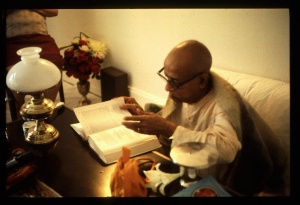CC Madhya 14.107: Difference between revisions
m (1 revision(s)) |
(Vanibot #0054 edit - transform synonyms into clickable links, which search similar occurrences) |
||
| (One intermediate revision by one other user not shown) | |||
| Line 1: | Line 1: | ||
{{ | [[Category:Sri Caitanya-caritamrta - Madhya-lila Chapter 14|C107]] | ||
<div style="float:left">'''[[Sri Caitanya-caritamrta|Śrī Caitanya-caritāmṛta]] - [[CC Madhya|Madhya-līlā]] - [[CC Madhya 14|Chapter 14: Performance of the Vṛndāvana Pastimes]]'''</div> | |||
<div style="float:right">[[File:Go-previous.png|link=CC Madhya 14.106|Madhya-līlā 14.106]] '''[[CC Madhya 14.106|Madhya-līlā 14.106]] - [[CC Madhya 14.108|Madhya-līlā 14.108]]''' [[File:Go-next.png|link=CC Madhya 14.108|Madhya-līlā 14.108]]</div> | |||
{{CompareVersions|CC|Madhya 14.107|CC 1975|CC 1996}} | |||
{{RandomImage}} | |||
==== TEXT 107 ==== | ==== TEXT 107 ==== | ||
<div | <div class="verse"> | ||
kalya ‘herā-pañcamī’ habe lakṣmīra vijaya | :kalya ‘herā-pañcamī’ habe lakṣmīra vijaya | ||
aiche utsava kara yena kabhu nāhi haya | :aiche utsava kara yena kabhu nāhi haya | ||
</div> | </div> | ||
| Line 12: | Line 16: | ||
==== SYNONYMS ==== | ==== SYNONYMS ==== | ||
<div | <div class="synonyms"> | ||
''[//vanipedia.org/wiki/Special:VaniSearch?s=kalya&tab=syno_o&ds=1 kalya]'' — tomorrow; ''[//vanipedia.org/wiki/Special:VaniSearch?s=herā&tab=syno_o&ds=1 herā]-[//vanipedia.org/wiki/Special:VaniSearch?s=pañcamī&tab=syno_o&ds=1 pañcamī]'' — the function of Herā-pañcamī; ''[//vanipedia.org/wiki/Special:VaniSearch?s=habe&tab=syno_o&ds=1 habe]'' — will be; ''[//vanipedia.org/wiki/Special:VaniSearch?s=lakṣmīra&tab=syno_o&ds=1 lakṣmīra]'' — of the goddess of fortune; ''[//vanipedia.org/wiki/Special:VaniSearch?s=vijaya&tab=syno_o&ds=1 vijaya]'' — welcome; ''[//vanipedia.org/wiki/Special:VaniSearch?s=aiche&tab=syno_o&ds=1 aiche]'' — such; ''[//vanipedia.org/wiki/Special:VaniSearch?s=utsava&tab=syno_o&ds=1 utsava]'' — festival; ''[//vanipedia.org/wiki/Special:VaniSearch?s=kara&tab=syno_o&ds=1 kara]'' — perform; ''[//vanipedia.org/wiki/Special:VaniSearch?s=yena&tab=syno_o&ds=1 yena]'' — as; ''[//vanipedia.org/wiki/Special:VaniSearch?s=kabhu&tab=syno_o&ds=1 kabhu]'' — ''at any time; ''[//vanipedia.org/wiki/Special:VaniSearch?s=nāhi&tab=syno_o&ds=1 nāhi] [//vanipedia.org/wiki/Special:VaniSearch?s=haya&tab=syno_o&ds=1 haya]'' — did not take place. | |||
</div> | </div> | ||
| Line 19: | Line 23: | ||
==== TRANSLATION ==== | ==== TRANSLATION ==== | ||
<div | <div class="translation"> | ||
“Tomorrow will be the function of Herā-pañcamī or Lakṣmī-vijaya. Hold this festival in a way that it has never been held before.” | “Tomorrow will be the function of Herā-pañcamī or Lakṣmī-vijaya. Hold this festival in a way that it has never been held before.” | ||
</div> | </div> | ||
| Line 26: | Line 30: | ||
==== PURPORT ==== | ==== PURPORT ==== | ||
<div | <div class="purport"> | ||
The Herā-pañcamī festival takes place five days after the Ratha-yātrā festival. Lord Jagannātha has left His wife, the goddess of fortune, and gone to Vṛndāvana, which is the Guṇḍicā temple. Due to separation from the Lord, the goddess of fortune decides to come to see the Lord at Guṇḍicā. The coming of the goddess of fortune to Guṇḍicā is celebrated as Herā-pañcamī. Sometimes this is misspelled as Harā-pañcamī among the ativāḍīs. The word herā means “to see” and refers to the goddess of fortune going to see Lord Jagannātha. The word pañcamī means “the fifth day” and is used because this takes place on the fifth day of the moon. | The Herā-pañcamī festival takes place five days after the Ratha-yātrā festival. Lord Jagannātha has left His wife, the goddess of fortune, and gone to Vṛndāvana, which is the Guṇḍicā temple. Due to separation from the Lord, the goddess of fortune decides to come to see the Lord at Guṇḍicā. The coming of the goddess of fortune to Guṇḍicā is celebrated as Herā-pañcamī. Sometimes this is misspelled as Harā-pañcamī among the ''ativāḍīs''. The word ''herā'' means “to see” and refers to the goddess of fortune going to see Lord Jagannātha. The word ''pañcamī'' means “the fifth day” and is used because this takes place on the fifth day of the moon. | ||
</div> | </div> | ||
__NOTOC__ | |||
<div style="float:right; clear:both;">[[File:Go-previous.png|link=CC Madhya 14.106|Madhya-līlā 14.106]] '''[[CC Madhya 14.106|Madhya-līlā 14.106]] - [[CC Madhya 14.108|Madhya-līlā 14.108]]''' [[File:Go-next.png|link=CC Madhya 14.108|Madhya-līlā 14.108]]</div> | |||
__NOTOC__ | |||
__NOEDITSECTION__ | |||
Latest revision as of 21:43, 19 February 2024

A.C. Bhaktivedanta Swami Prabhupada
TEXT 107
- kalya ‘herā-pañcamī’ habe lakṣmīra vijaya
- aiche utsava kara yena kabhu nāhi haya
SYNONYMS
kalya — tomorrow; herā-pañcamī — the function of Herā-pañcamī; habe — will be; lakṣmīra — of the goddess of fortune; vijaya — welcome; aiche — such; utsava — festival; kara — perform; yena — as; kabhu — at any time; nāhi haya — did not take place.
TRANSLATION
“Tomorrow will be the function of Herā-pañcamī or Lakṣmī-vijaya. Hold this festival in a way that it has never been held before.”
PURPORT
The Herā-pañcamī festival takes place five days after the Ratha-yātrā festival. Lord Jagannātha has left His wife, the goddess of fortune, and gone to Vṛndāvana, which is the Guṇḍicā temple. Due to separation from the Lord, the goddess of fortune decides to come to see the Lord at Guṇḍicā. The coming of the goddess of fortune to Guṇḍicā is celebrated as Herā-pañcamī. Sometimes this is misspelled as Harā-pañcamī among the ativāḍīs. The word herā means “to see” and refers to the goddess of fortune going to see Lord Jagannātha. The word pañcamī means “the fifth day” and is used because this takes place on the fifth day of the moon.